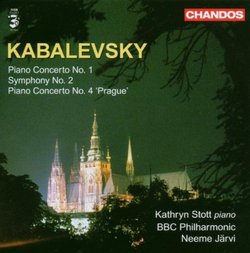| All Artists: Dmitry Kabalevsky, Neeme Järvi, BBC Philharmonic Orchestra, Kathryn Stott Title: Kabalevsky: Piano Concerto Nos. 1 & 4; Symphony No. 2 Members Wishing: 0 Total Copies: 0 Label: Chandos Original Release Date: 1/1/2006 Re-Release Date: 11/21/2006 Genre: Classical Styles: Chamber Music, Forms & Genres, Concertos, Historical Periods, Classical (c.1770-1830), Modern, 20th, & 21st Century, Instruments, Keyboard, Symphonies Number of Discs: 1 SwapaCD Credits: 1 UPC: 095115138427 |
Search - Dmitry Kabalevsky, Neeme Järvi, BBC Philharmonic Orchestra :: Kabalevsky: Piano Concerto Nos. 1 & 4; Symphony No. 2
 | Dmitry Kabalevsky, Neeme Järvi, BBC Philharmonic Orchestra Kabalevsky: Piano Concerto Nos. 1 & 4; Symphony No. 2 Genre: Classical
|
Larger Image |
CD Details |
CD ReviewsA Very Appealing Disc D. A Wend | Buffalo Grove, IL USA | 01/19/2007 (5 out of 5 stars) "I have the earlier records that Kathryn Stott made of Kabalevsky's second and third piano concertos, and here she completes the cycle with the first and fourth concertos. The First Piano Concerto was first performed in 1931 and is a romantic work following in the line of Rimsky-Korsakov, Rachmaninov and Tchaikovsky with a dash of Prokifiev's sarcasm thrown in. The music is lyrical and quietly reflective and at just over 30 minutes Kabalevsky's longest concerto. The center movement is a theme with 5 variations and a coda that sounds as if a folk melody might have been the inspiration. Of the variations, my favorite is probably the fourth with its sparkling melody for the piano. The piano has quite a range of expression that Ms. Stott plays beautifully. I have a liking for this concerto and have the recording by In-Ju Bang that also came out in 2006. As attractive as In-Ju Bang's playing is I find myself preferring this recording for its clarity and the sensitivity Kathryn Stott brings to the music.
I have heard the Second Symphony before and considered it not very interesting but this performance by Neeme Jarvi (while not making a believer out of me) has made the music more approachable. The Symphony comes from 1934 when Social Realism was in its heyday. Cast in three movements, the symphony lasts about 25 minutes and expresses the Soviet ideal of folk nationalism. The symphony begins energetically and continues with brief reflective interludes between the driving main theme. The slow movement is elegiac and broodingly lyrical, somewhat reminiscent of the music of Kabalevsky's teacher Nokolai Myaskovsky. The finale is triumphant and heroic bringing the symphony to a rousing conclusion. The Fourth Piano Concerto was composed in 1979 for a piano competition and was first performed by Yuri Popov who recorded it. The concerto acquired the name "Prague" from three folk songs (Czech, Moravian and Slovakian) used in the work. The concerto lasts about 12 minutes and is scored for piano and string orchestra with a snare drum. The piano part is technically challenging, in keeping with its origin for a competition and is recalls Ravel and Poulenc in the fast and brilliant playing of the soloist in the first movement. The middle movement is quiet and reflective (reminding me a little of the slow movement from Bartok's Second Piano Concerto) and closes with a fast third movement with brilliant runs by the soloist, also recalling Pouilenc. " |

 Track Listings (15) - Disc #1
Track Listings (15) - Disc #1